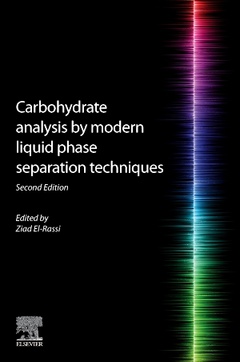Carbohydrate Analysis by Modern Liquid Phase Separation Techniques (2nd Ed.)
Coordonnateur : El Rassi Ziad

Carbohydrate Analysis by Modern Liquid Phase Separation Techniques, Second Edition, presents readers with the various principles of modern liquid phase separation techniques and their contributions to the analysis of complex carbohydrates and glycoconjugates. In a selection of all-new chapters, this fully updated volume covers each technique in detail. The book aims to help analysts solve any of the many practical problems they may face in tackling the analysis of carbohydrates. In addition, it addresses current difficulties that must be resolved in carbohydrate research, thus inspiring further important technological developments to meet these challenges.
This is an essential resource for anyone seeking a broad view of the science of carbohydrates and separation techniques.
2. Ion-Exchange Chromatography of Carbohydrates
3. HILIC
4. Affinity Chromatography
5. Size Exclusion Chromatography
6. Multi-dimensional HPLC
7. Analysis of Carbohydrates in Food and Beverages
8. Mass Spectrometry
9. Preparative HPLC
10. FFF
11. SFC
12. CE and CEC of Carbohydrates
13. CE of Glycoconjugates
14. CE-MS of Carbohydrates
15. HPLC-MS of Carbohydrates
16. Supercritical Fluid Chromatography-MS
17. Electrochemical detectors for carbohydrates in CE and HPLC
18. Derivatization Techniques for HPLC and CE of Carbohydrates
New industrial users of separation techniques and their applications to carbohydrates analysis; graduate students in most branches of the life sciences
- Covers the basic principles of modern liquid phase separation techniques, along with their applications
- Compiles up-to-date information on the field of carbohydrate analysis, along with updates on separation science
- Focuses on problems currently faced in carbohydrate analysis and the solutions necessary for further progress
Date de parution : 08-2021
Ouvrage de 954 p.
15x22.8 cm
Thèmes de Carbohydrate Analysis by Modern Liquid Phase Separation... :
Mots-clés :
: Capillary electrophoresis; : Glycoproteins; Amperometry; Analyte modification; Anhydrosugars; Biomarker; Biomarker discovery; Biomolecular interaction; Biosimilar; Capacitively coupled contactless conductivity detection; Capillary electrochromatography; Capillary electrophoresis; Carbohydrate; Carbohydrates; CarboPac; Cation exchanger; CE-MS; Chondroitin sulfate; Conductivity; Conductivity detection; Derivatization; Dermatan sulfate; Detection systems; Dietary carbohydrates; Dissociation constant; Dynamic equilibrium; Electrolyte systems; Electrophoresis; Electrospray ionization; Electrospray ionization mass spectrometry; Enzyme; Evaporative light scattering; Food analysis; Food carbohydrates; Frontal affinity chromatography; Gangliosides; Glucose unit value; Glycan; Glycans; Glycocode; Glycoconjugate; Glycoform; Glycolipids; Glycomics; Glycopeptide; Glycopeptides; Glycoprotein; Glycoproteins; Glycoproteomics; Glycosaminoglycans; Glycosphingolipids; Glycosylation; Heparan sulfate heparin; Heteropolysaccharides; High-performance liquid chromatography; HILIC-MS; HPAEC-PAD; HPLC; Hyaluronic acid or hyaluronan; Hydrophilic interaction; Hydrophilic interaction liquid chromatography; Hydrophobic interaction chromatography; Immunoassay; Intact mass; Ion mobility separation mass spectrometry; Ion-moderated partitioning chromatography; Isoform; Isomeric separation; Lab-on-a-chip; Lectin; Ligand-exchange chromatography; Liquid chromatography; Mass spectrometry; Microchip; Microchip electrophoresis; Monoclonal antibody; Monosaccharide; Monosaccharides; N-Glycan; Oligosaccharide; Oligosaccharides; Point-of-care testing; Polymer; Polysaccharides; Portable electrophoresis; Prebiotic analysis; Proteoform; Proteoglycans; Pyridylaminated; Reversed-phase chromatography; Sialic acids; Silica; Simulation by PeakMaster; Size exclusion; Size exclusion chromatography; Software tools; Structure identification; Subunit analysis; Tissue and body fluids; Vaccines; Weak affinity



